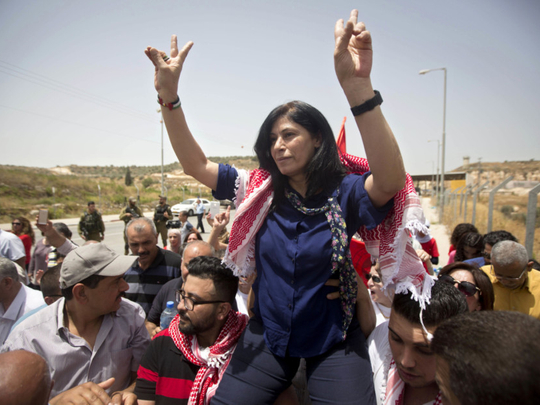
Often, the complexity of the international circumstances provide historical opportunities for a movement, faction or a party to review its political experience for public interest, especially if any of them faces organisational, intellectual, political or structural crisis. In this context, after ten ‘fruitless’ years of inter-Palestinian divisions that resulted in a very serious political and geographical (West Bank versus Gaza Strip) schism between the two major organisations — Fatah and Hamas — it is vital to consider the Palestinian national interest and never accept the current fragmentation as a matter of fact. More serious is the fact, as seen by an increasing number of observers and large segments of Palestinians and other Arabs, that the current state of schism has transcended an ‘ideology of exclusion’ to the core of the very dangerous concept of ‘getting rid of the other’! All of these concerned parties believe, right or wrong, that the Fatah and Hamas movements have failed the test since they put their personal and factional interests above those of the Palestinian people and their national cause. They have thus ignored facts on the ground and turned into two conflicting political movements (indeed two separated entities/sovereignties — one solely controlling the West Bank and the other solely controlling the Gaza Strip) whose existence is tied to the seat of power that led to the failure to possess the tools of change, and consequently national unity.
My very good friend professor Shafiq Al Gabra proposes a way out of the present deadlock, in an article titled ‘The Third Way (other than that of either Fatah or Hamas) in the Palestinian National Project’. He predicts that “Palestine will produce a third way which will be a popular path stemming from the current state of fear of the future, which carries the Palestinian national project in its spirit and experience. This means that all the resisting phenomenons will come together to meet into a larger one within a clearer vision”.
Yes, what is happening in the Palestinian arena is not only the continuation of differences and disputes between two authorities/sovereignties, but it is a prolonged, very difficult and complex crisis that has brought the Palestinian cause on the Palestinian and Arab streets to an unprecedented state of isolation, compounded with a sad situation that threatens the entire network of national, regional and international relations that have been built around the rights of the Palestinian people over decades of struggle as a safety net and a vital incubator of these rights. Therefore, it is time for a “third way”. In this context, many assume that the struggle of the Palestinian captive (prisoners’) movement is an integral part of this prescribed “third way”.
Also, it is important to refer here to the “Palestinian Flare Up”/Uprising in the West Bank that erupted in October 2015, in which, 322 Palestinians fell martyrs, including 29 children (up till now). This flare-up (“Habbah”) continues to emphasise that the Palestinian youth, under the pressure of marginalisation and societal problems, as well as the state of oscillation between the hope and desperation they live in, believe that the Palestinian leadership does not support a new “Habbah” and that the positions of most of the factions will not exceed the issuance of “verbal support/ statements”! Nevertheless, a persistent segment of Palestinian youth has adopted resistance as long as the occupation remains, especially after it has proved impossible to prevent individual operations resulting from an energy generated by the ‘dynamite’/ combination of Palestinian despair and hope.
The same is also true of the BDS, (the boycott, divestment and sanctions) campaign against Israeli occupation. This campaign has attracted thousands of Arab and international supporters and has stirred considerable anger and anxiety in Israel after causing significant political, media, moral and economic losses to the Zionist state. This campaign, in the words of Israeli writer Gideon Levy, in Israeli newspaper Haaretz, “Is a fair tool and a legitimate means of success in the war against the Israeli occupation”. The aforementioned anger and concern in Israel pushed the Zionist state to allocate a special budget and introduce a specialised apparatus to fight the BDS movement. In this regard, Levy concludes that the Zionist state has further weakened its political position because “Israel uses the boycott and advises others to use it ... just as the international community uses it, imposing sanctions on Russia after its occupation of Crimea”.
The “Third Way” doesn’t, of course, mean to eliminate the entire Palestinian history of struggle or return to scratch. What is needed is an action of a solid National Front based on the ‘understanding’ of a unified political system shared by Fatah and Hamas (as well as the Palestinian factions that have the torch of struggle), capable of taking serious steps to crystallise a new resistance orientation that reflects its weight within a general Palestinian framework. Such a “Front” should alienate itself from the current Palestinian factional dispute, be allied to the values of national liberation, political and social democracy and derive its strength from the depth of the crisis of occupation that a major section of Palestinian people are living under and consequently suffering from — economically, politically and socially.
Such a “Front” should also reaffirm the need to adhere to the provisions of the National Conciliation Document (that was proposed in May 2006 by the Palestinian captive movement in Israeli prisons), which offered a political formula acceptable to everyone to respect the legitimacy and establish a Palestinian national path that carries the burden of continuing the struggle to achieve the Palestinian national rights.
Professor As’ad Abdul Rahman is the chairman of the Palestinian Encyclopaedia.









